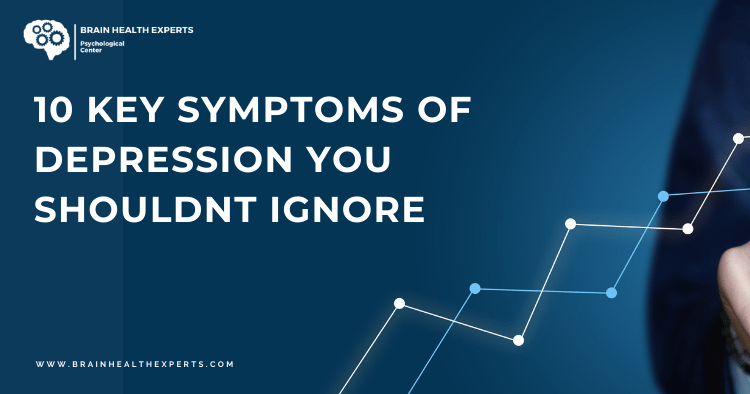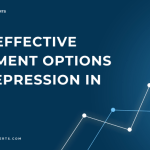Table of Contents
- Introduction
- 1. Persistent Sadness
- 2. Loss of Interest
- 3. Changes in Appetite
- 4. Sleep Disturbances
- 5. Fatigue or Lack of Energy
- 6. Feelings of Worthlessness or Guilt
- 7. Difficulty Concentrating
- 8. Psychomotor Agitation or Retardation
- 9. Social Withdrawal
- 10. Thoughts of Death or Suicide
- Conclusion
- FAQs
- Resources
Introduction
Depression is more than just feeling sad; it’s a complex mental health condition that affects millions of people globally. Recognizing the signs early can make a significant difference in recovery. In this article, we’ll explore ten key symptoms of depression that you shouldn’t ignore, helping you or someone you know take the first steps toward seeking help.
1. Persistent Sadness
One of the hallmark symptoms of depression is a long-lasting feeling of sadness or emptiness. Unlike fleeting feelings of disappointment or sadness, this emotional state can persist for weeks or months, affecting your daily life and relationships. You might feel as though a dark cloud is hanging over you, making it hard to enjoy even the simplest pleasures.
If you or someone you know is experiencing this feeling for an extended period, it might be time to reach out for support. Understanding the impact of positive thinking can be beneficial. 10 Ways Positive Thinking Transforms Your Daily Life offers strategies to uplift your mood.
2. Loss of Interest
Known as anhedonia, this symptom involves a significant decrease in interest or pleasure in activities you once enjoyed. Whether it’s hobbies, socializing, or even work, the enthusiasm might seemingly vanish overnight. This can lead to further isolation, compounding feelings of sadness and worthlessness.
If your favorite activities no longer bring joy, it’s crucial to recognize this as a potential symptom of depression rather than a mere phase. Techniques to cultivate a positive mindset can help here—explore 10 Powerful Techniques to Cultivate Positive Mindset.
3. Changes in Appetite
Depression can significantly impact your eating habits. Some may experience an increase in appetite, leading to weight gain, while others may lose their appetite entirely, resulting in weight loss. These changes are usually accompanied by feelings of guilt, shame, or anxiety related to food.
If you notice a drastic change in your eating habits that lasts more than a few weeks, consider consulting a healthcare professional. Positive affirmations can also help combat negative feelings surrounding food—check out 10 Powerful Affirmations to Boost Mental Health Today.
4. Sleep Disturbances
Sleep issues are common in depression, which can manifest as insomnia or hypersomnia (excessive sleeping). You might find it hard to fall asleep, stay asleep, or feel rested upon waking. This lack of quality sleep can exacerbate other symptoms, creating a cycle that’s hard to break.
Establishing a healthy sleep routine and discussing sleep disturbances with a doctor can lead to better management of these symptoms. Additionally, consider mindfulness practices to improve sleep quality—10 Mindfulness Techniques to Improve Your Sleep Quality.
5. Fatigue or Lack of Energy
Chronic fatigue is another common symptom of depression. Even after a full night’s sleep, you might feel exhausted. This overwhelming fatigue can hinder daily activities, making even simple chores feel monumental. It’s important to differentiate between normal tiredness and fatigue that feels disproportionate to your activities.
If fatigue is affecting your quality of life, it’s essential to seek help. Engaging in positive thinking exercises may help improve your energy levels—consider 10 Positive Thinking Exercises to Boost Mental Health.
6. Feelings of Worthlessness or Guilt
Many individuals with depression grapple with intense feelings of worthlessness or guilt that can seem unwarranted. You may ruminate over past mistakes or perceive yourself as a burden to others. This negative self-talk can significantly impact your self-esteem and overall mental health.
Recognizing these thoughts as symptoms of depression rather than truths about yourself can be the first step toward healing. 10 Tips to Overcome Negative Thought Patterns Today can provide valuable guidance.
7. Difficulty Concentrating
Depression can cloud your ability to focus, make decisions, or remember details. This cognitive impairment can affect work performance, academic achievement, and even personal relationships. You might find that simple tasks take longer than usual or that you frequently forget things.
If cognitive issues are impacting your daily life, it’s worth discussing with a healthcare professional. Techniques for stress management can also help improve concentration—consider 10 Proven Stress Management Techniques for Daily Relief.
8. Psychomotor Agitation or Retardation
This symptom refers to noticeable changes in your physical movements. You may feel restless, leading to fidgeting or an inability to sit still (psychomotor agitation). Conversely, you might experience a slowdown in your movements or speech (psychomotor retardation), which can be very noticeable to others.
If you notice these changes in yourself or someone else, professional help is essential. Mindfulness practices can help manage restlessness—explore 10 Mindfulness Practices to Reduce Stress Effectively.
9. Social Withdrawal
A desire to isolate oneself from friends, family, and social activities can be a significant indicator of depression. You may find yourself canceling plans, avoiding social interactions, or feeling drained after being around others. This withdrawal can worsen feelings of loneliness, making it a vicious cycle.
Reaching out to a trusted friend or professional can help combat this isolation. Engaging in positive thinking can also improve your social interactions—see 10 Ways Positive Thinking Boosts Your Relationships for tips.
10. Thoughts of Death or Suicide
Perhaps the most critical symptom of depression is experiencing thoughts of death or suicide. This can range from passive thoughts about not wanting to live anymore to active planning. If you or someone you know is struggling with these feelings, it’s crucial to seek immediate help.
In the U.S., you can contact the National Suicide Prevention Lifeline at 1-800-273-TALK (1-800-273-8255). If you’re in another country, please consult local resources.
Conclusion
Understanding the symptoms of depression is vital in fostering awareness and encouraging those affected to seek help. If you or someone you know is experiencing any of these symptoms, don’t hesitate to reach out for support. Remember, you are not alone, and there are resources and people willing to help.
FAQs
1. How long do symptoms of depression last?
Symptoms can vary widely; some may last for weeks, months, or even longer. It’s important to seek help if symptoms persist.
2. Can depression be treated?
Yes! Treatment options include therapy, medication, lifestyle changes, and support groups. Consult a healthcare professional for personalized recommendations.
3. Are there different types of depression?
Yes, there are several types, including major depressive disorder, persistent depressive disorder (dysthymia), bipolar disorder, and seasonal affective disorder (SAD).
4. How can I help a friend who is depressed?
Listen without judgment, encourage them to seek professional help, and offer to support them through their journey.
Resources
- National Institute of Mental Health (NIMH)
- American Psychological Association (APA)
- Mental Health America
By being informed about the symptoms of depression, you can take a proactive approach in helping yourself or someone else. Remember, seeking help is a sign of strength!





